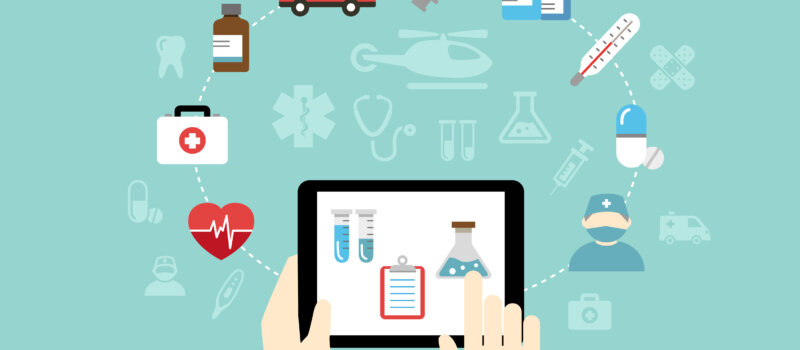Healthcare consumerization has changed the game for medical services, as patients have increasing options. One differentiator that could make or break your practice is how you use mobile technology in healthcare.
Patients now expect health services to offer mobile apps and digital access. Furthermore, 90% of patients won’t stay with providers that don’t deliver a satisfactory digital experience.
Do you run a small or mid-sized care team and want to know where to start with mobile healthcare technology? Learn the essentials in this guide.

Key Takeaways:
- Mobile technology involves all the ways patients and providers use mobile devices in the treatment process.
- A cloud communications service from a hands-on provider ensures small and mid-sized teams can have a worry-free mobile experience.
- Using mobile technology in healthcare saves time and money and leads to better patient outcomes.
What Is Mobile Technology in Healthcare?
Mobile health refers to how patients use mobile devices to receive health and wellness support. It can also describe the ways providers deliver effective care using mobile devices.
Naturally, the smartphone is at the center of mobile technology in healthcare. Patients can communicate with care professionals for advice and even diagnosis through voice or video calls.
Also, physicians and nurses no longer need to sit at a desktop PC to access confidential records or research symptoms. HIPAA-compliant communication and references can be available through mobile apps. Beyond mobile phones, tablet computers are still popular and can be more practical in various settings for patients and care teams.
Wearable devices are another vital advancement in mobile healthcare. With these tools, medical professionals can easily and accurately monitor a patient’s condition or progress. For instance, smartwatches and internet-enabled implants can alert an individual and their care team to danger or report detailed specifics about a person’s status.

What Are the Top Challenges of Implementing Mobile Healthcare Technology?
Some teams may hesitate to utilize mobile technology in healthcare because of the potential challenges. Potential barriers to entry include:
- Compliance with regulations: Any apps or services must meet HIPAA’s strict standards.
- Cost and time management: The time and monetary expense for installation and maintenance might be prohibitive for smaller teams.
- Interoperability with other systems: Medical care can become inefficient and dangerously ineffective when apps don’t share data.
- System quality: Whether for patient education or professional reference, the system must be user-friendly and up-to-date.
- Service reliability: The service should be available whenever medical professionals and patients need it.
One key to addressing these issues is having a rock-solid communications provider. An experienced vendor prevents manageable challenges from becoming insurmountable roadblocks.
For example, Intermedia’s unified communications solution has full HIPAA compliance and 99.999% reliability. Its convenient integration with electronic health record apps minimizes interoperability issues.
Additionally, the low-cost cloud platform allows teams of any size to enjoy the full benefits of mobile technology in healthcare. Round-the-clock support ensures you always have the help you need to keep your system running smoothly.
How Can Mobile Technology Enhance Your Practice?
You might think you can’t afford to invest in mobile technology in your healthcare practice. However, a more competitive health and wellness market means you can’t afford not to.
Uncover a few of the ways mobile tech enhances your team.
Improved Time Management
Mobile connectivity with your team and patients can be a massive timesaver. Facilities that utilize telemedicine whenever possible are more efficient for patients and providers.
A unified system with mobile capabilities also makes scheduling visits and following up much easier as it integrates with your calendars and offers automated booking verification. If you’re a professional who is constantly on the go, secure mobile apps allow you to get vital work done wherever you are.
Likewise, you can always meet with your team, even if they work in various locations. Video conferencing is secure and as collaborative as in-person meetings with interactive screen sharing.
Reduced Costs
Cloud-based mobile technology in healthcare reduces operational costs as well. A unified communications platform combines all channels under one provider, offering the cost savings of bundling and simplifying the management of your vendor accounts.
Don’t forget how cloud data storage and archiving help you, either. With a compliant platform, you don’t have to maintain expensive servers. Your team also avoids the costly effects of a data breach or data loss.
Your provider stays alert to any potential threats and protects you. Continual backup keeps your information safe in the event of a disaster or other emergency.
Better Patient Outcomes
Most importantly, mobile technology allows you to render the highest standard of care. Your team is at its best when you can accomplish more with fewer resources. Enhanced collaboration with mobile healthcare tech helps you find and address root causes more quickly to prevent hospital readmissions or worsening conditions.
Also, mobile technology lets you educate patients more thoroughly and effectively. You can share actionable insights from your data, helping them understand their condition better and what to do about it. As they take better care of themselves, their overall well-being improves, and they are happier with your services.
Are You Ready To Optimize Mobile Technology in Your Healthcare Organization?
Implementing mobile technology in your healthcare practice can boost the patient experience. It will also make things easier for your team.
If you’re ready to leverage advanced mobile tech to provide superior patient care, talk to our team at Intermedia. We’ll help you set up a communications platform that can facilitate all aspects of mobile technology in healthcare.
August 22, 2024
Explore other posts on these topics: Healthcare




